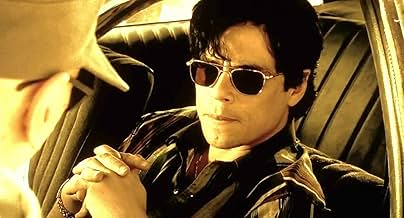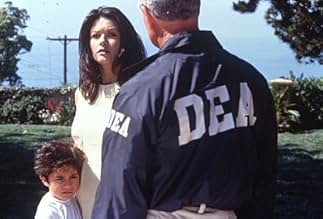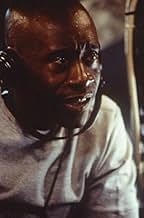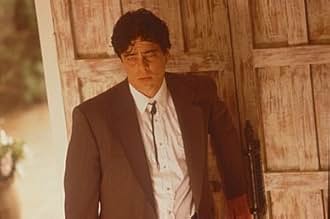ड्रग्स के खिलाफ अमेरिका के बढ़ते युद्ध का नेतृत्व करने के लिए राष्ट्रपति द्वारा एक रूढ़िवादी न्यायाधीश नियुक्त किया जाता है।ड्रग्स के खिलाफ अमेरिका के बढ़ते युद्ध का नेतृत्व करने के लिए राष्ट्रपति द्वारा एक रूढ़िवादी न्यायाधीश नियुक्त किया जाता है।ड्रग्स के खिलाफ अमेरिका के बढ़ते युद्ध का नेतृत्व करने के लिए राष्ट्रपति द्वारा एक रूढ़िवादी न्यायाधीश नियुक्त किया जाता है।
- निर्देशक
- लेखक
- स्टार
- 4 ऑस्कर जीते
- 73 जीत और कुल 86 नामांकन
- Salazar Soldier
- (as Jose Yenque)
- …
फ़ीचर्ड समीक्षाएं
Based on the channel 4 series Traffik this is an open-minded intelligent look at the war on drugs. Looking at the problem across several interlinking stories allows us to hear everyone's side to see the internal problems in Mexico, to see the futility of the DEA's actions even to see the scope of the problem facing the US political machine as it tries to fight a war against the drugs trade on all sides. The stories are told with out over doing it action happens without pomp or fanfare, explosions happen in silence, killings are brutal, swift and final. This is not an action movie. The thoughtful nature means the film moves slowly and, if you're not used to following stories then it may frustrate you. However those wishing something to get you thinking, during and after the film should be rewarded.
The film is intelligent far beyond the subject matter. The direction and editing is perfect. The scenes in Mexico are all yellow and washed out giving a desolate feeling, the scenes in political America are given a blue hue to give a colder, detached feel to the business while the scenes with the DEA are noticeably bright and realistic. This is typical of the intelligence put into the film it rewards you the more you watch it. The casting is another example of how right the film is.
Del Toro is perfect he gets the moodiness spot on but also has a fun side to his character. Cheadle and Guzman are as good as they always are and play off each other well they have an element of the `buddy cop' couple without becoming caricatures. Douglas is really good how often can you say that!? His young wife is also very good I expected her to be the weak link but she gave a good performance. These are the main players but really the cast is deep in quality from those that have bigger roles (Quaid, Bratt, Miguel Ferrer) to those that essentially have only a few lines (Albert Finney, Peter Riegert).
The strength of the film is that it lets you work it out yourself. It never goes one way or the other on the drugs issue and leaves you to decide for yourself what should happen. This is rare in an `issue' film and it should be commended. The film allows long silences for us to think but yet is never boring or dull.
Overall this is a really good film. It is shorter and more polished than the mini-series it came from, but it is very intelligently done and is though-provoking. Anyone who thinks they are sure of their stance on drugs should watch this no matter what you think this will highlight the fact that it is a complex problem to which there is no simple solution. Excellent.
Like an abstract expressionist master, Steven Soderbergh stands in the center of a canvas that stretches from Cincinnati to Tijuana. He mixes materials and splashes colors with the dash and power of a Jackson Pollock. His materials are skillful acting, lively editing, a dynamic music score, and an unflinching camera. (He did his own lensing, under a pseudonym). The artist's aim? To paint a picture of our country's drug problem.
Scripted by Stephen Gaghan, "Traffic" has its roots in a 1989 British television mini-series, "Traffik," which followed the drug trade from Pakistan to Britain. There are three loosely related stories, each with its own color coding--and as with Pollock, there is nothing random about where the paint splashes upon the canvas.
Blue hues bathe blue bloods in Cincinnati where an Ohio Supreme Court Justice (Michael Douglas) is flattered into taking a job as national drug czar, just as his bright young daughter (Erika Christensen) is seduced into addiction by her prep-school friends.
A rich golden-yellow surrounds San Diego where a comely couple (Catherine Zeta-Jones and Steven Bauer) occupy the upper links of the drug chain and spend ill-gotten cash on clothes, cars and country clubs. They are pursued by two undercover cops (Don Cheadle and Luis Guzman) who spend most of their screen time cooped up in a surveillance van.
In Mexico, a washed-out, burnished brown bespatters a desert of desperation as two Baja policemen (Benicio Del Toro and Jacob Vargas) pull off a major drug bust only to be themselves busted, by a sinister general (Tomas Milian) who notifies them that 'I will take over from here.' Each color signifies its own impenetrable culture, and when Douglas crosses into Mexico to meet his counterpart, we know (but he doesn't) that his fellow drug czar is really a drug lord.
The performances were exceptional, especially considering that no one was given star treatment. Much of the film was shot with existing light and Soderbergh kept the composition wide, letting the actors create their own space. Douglas was surprisingly believable as the would-be czar and bookends an Oscar-worthy year with his scruffy professor in the earlier "Wonder Boys." His real-life wife, Zeta-Jones (carrying their child), gave a quite credible performance as a society snob who turns ruthless when her status is threatened.
Other stand-outs include Christensen's drugged-out daughter, Del Toro's street smart Mexican cop and Cheadle's dedicated drug buster. In fact, there was not a weak performance in the bunch, including crucial cameos by veterans Peter Riegert and Albert Finney. Real people even play roles: Douglas's fictional drug czar confers with real-life senator Orrin Hatch, while actual customs officials relate their day-to-day drug enforcement dilemmas.
Each of the three stories ends with a glimmer of hope. But despite small battles being won, the film's verdict is that the larger war is plainly being lost. As if on cue, White House Director of Drug Policy, Barry McCaffrey, has resigned effective January 6, 2001. The real-life outgoing czar, a former general, has become a vocal supporter of increased funding for treatment programs.
Like Pollock, Soderbergh continues to stretch the boundaries of his art, as he did a dozen years ago with "sex, lies, and videotape," and more recently with the undervalued "The Limey." "Erin Brockovich" though fairly conventional by his standards, nevertheless completes a year any director would envy.
Rating: 3 1/2 stars out of 4
That the war on drugs cannot be won, and is hypocritical to boot, is a message that needs as much air-time as it can get.
I just got back from seeing it, and it certainly rates as one of the best story-based drama's I've ever seen. Being a big fan of movies with different storylines overlapping (as Magnolia) I was highly anticipating this movie. And of course the big oscar nominations and the prizes it already won made it even more desirable.
It didn't let me down one bit. The different story's were all excellent. Being that the mexican one was in my opinion the best one. Especially Benicio Del Toro (remember him in Fear and Loathing in Las vegas, the BEST drugs movie ever) being absolutely brilliant. But also the storyline involving Michael Douglas with his problems dealing with a daughter on drugs (well acted out by newcomer Erika Christensen) is remarkable. The topic drugs is clearly highly talked about especially in the United States, and this is actually the first movie which shows all aspects of it. The dealing and smuggling, the addiction, the risks of being a narcotics agent and the political point of view. It's hard to find a film that's so complete, everyone will feel connected to one of the storylines because everyone deals with or has dealt with drugs before, even if it's just a one time mariuhana use. That's why this movie will appeal to a very large crowd.
Anyway when you look at the flaws then maybe some will say that it takes too long, or that some of the scenes are a bit slow. But does everything go fastpaced in real life? It just tries to sketch a realistic view of handling with drugs. And maybe there isn't a lot of action going on, but that's not the goal of the movie.
The only thing I found when watching the movie was that the switching between movielines happened a little too often. I'd preferred if it stayed with one story a little longer. Just a tiny flaw that I personally noted.
Traffic is a film that has to sink in, when you start to think about it it just gets better and better. I can't wait for the official release here in Holland, so that I can see it again.
Oscar for Del Toro in any case !!!!!! And throw in an oscar for best film too. It deserves it.
Traffic takes on the complex issues involved with the war on drugs in the United States and Mexico from the view of these nations as a whole to the very personal level. In the film, three stories unfold to illustrate the near impossibility of ever stopping the drug trade, despite the billion dollars that the US spends each year for just that cause. While the tales are related, the characters rarely, if ever, cross paths with one another. This is one of the elements that allows Soderbergh to deliver his message so effectively.
The first story features Benicio Del Toro as Javier Rodriguez Rodriguez. A cop in Baja, Mexico, he enforces the law and allows the wheels to be greased from time to time. After pulling off a huge drug bust on the Juarez drug cartel, the powerful General Salazar swoops in to confiscate all of the drugs and the credit. Later, Javier and his partner are recruited by Salazar to fight the war on drugs by aiding him in bringing down the Obregon cartel that has plagued Tijuana for some time.
Meanwhile, back in the States, Judge Robert Wakefield (Michael Douglas) of the Ohio Supreme Court is about to be appointed by the President as the nation's new leader in the drug war. For the judge, the drug war is about to become more personal than he could ever have imagined.
In San Diego, Monty (Don Cheadle) and Ray (Luis Guzman) are two federal agents perpetrating a drug bust on a slimy drug supplier named Eduardo Ruiz (Miguel Ferrer). The events that follow lead them up the drug food chain to Carlos Ayala, a well-to-do suburban man who has been smuggling illegal drugs into the country from Mexico. His arrest leaves his pregnant wife, Helena (Katherine Zeta-Jones, who was really pregnant during the film), to fend for herself while taking care of their son, court costs, and a $3 million dollar debt to the drug lords in Mexico.
Traffic, written by Simon Moore (the writer for the British miniseries, Traffik, upon which this script is based), is superbly crafted and woven. We learn just enough about each character to give us some insight into their motives for the courses they choose to follow. By the films end, matters are not neatly wrapped up; there is not a fairy tale ending. This simply adds to the realism of the issues presented within the movie. Furthermore, the intertwining stories drive home the fact that drugs are closer to you than you think.
The script is bolstered by the phenomenal, ensemble cast. Zeta-Jones and Del Toro have both received Golden Globe nominations for Best Supporting Actress and Actor in a drama for their roles in this film. Don Cheadle is superb in his role. Michael Douglas gives his usual performance while Erika Christensen does a good job as his daughter. Topher Grace (of TV's That 70's Show) is excellent as her upper-class, druggie boyfriend. Dennis Quid's character, while played adequately, is underused.
The stories were shot using various filters and lenses, neatly separating them as the film went from one to another and adding to the viewing pleasure of the movie. Mexico is filmed through a hand held camera and yellow lens to give it a dry, grainy, shaky look that heightens the feel of unrest involved with Del Toro's situation. Douglas' story is initially filmed in a hue of solemn, comforting blue. Zeta-Jones' story is filmed without the use of lenses, suggesting that her situation and actions are the most realistic and achievable of all those presented.
Despite some dialogue that spouts off statistics and seems a bit preachy, Traffic ranks among the top ten films of 2000, surpassing even Soderbergh's other venture, Erin Brokovich. Don't be surprised if this film picks up the Oscar for Best Picture.
By film's end, the message is clear and powerful. The fight against drugs is a long, uphill battle, but it is better than no battle at all.
क्या आपको पता है
- ट्रिवियाThe scene in which Michael Douglas takes his trip to the California border crossing to discuss drug interdiction was actually shot at the Tijuana crossing. The video and sound quality are so low in part because it wasn't intended to be part of the movie. Douglas, out of character, started asking Rudy M. Camacho about drug trafficking on the border. At the time, Camacho was the real-life Customs chief in charge of the California border crossings. Steven Soderbergh began filming it with a hand-held camera, praying that Camacho wouldn't address the actor as "Mr. Douglas".
- गूफ़Francisco Flores has distinctive wounds on his left cheek and forehead when first shown in surveillance photos, but those wounds are only visible after he is tortured by General Salazar's men, long after the photos were taken.
- भाव
General Ralph Landry: You know, when Khruschev was forced out, he sat down and wrote two letters and gave them to his successor. He said - "When you get yourself into a situation you can't get out of, open the first letter, and you'll be safe. When you get yourself into another situation you can't get out of, open the second letter". Well, soon enough, this guy found himself into a tight place, so he opened the first letter. Which said - "Blame everything on me". So he blames the old man, it worked like a charm. He got himself into a second situation he couldn't get out of, he opened the second letter. It said - "Sit down, and write two letters".
Robert Wakefield: [laughs] Yep.
- क्रेज़ी क्रेडिटThere are no opening credits except for the film's title in the lower left corner.
- इसके अलावा अन्य वर्जनThe Criterion Collection DVD is presented in 1.85:1, whilst the Criterion Blu-ray is presented in 1.78:1. According to the Blu-ray insert, the latter is the director's preferred ratio.
- साउंडट्रैकGive The Po' Man A Break
Written by Fatboy Slim (as Norman Cook)
Performed by Fatboy Slim
Courtesy of Astralwerks Records
टॉप पसंद
विवरण
बॉक्स ऑफ़िस
- बजट
- $4,80,00,000(अनुमानित)
- US और कनाडा में सकल
- $12,41,15,725
- US और कनाडा में पहले सप्ताह में कुल कमाई
- $1,84,725
- 31 दिस॰ 2000
- दुनिया भर में सकल
- $20,75,15,725
- चलने की अवधि2 घंटे 27 मिनट
- रंग
- ध्वनि मिश्रण
- पक्ष अनुपात
- 1.85 : 1

























